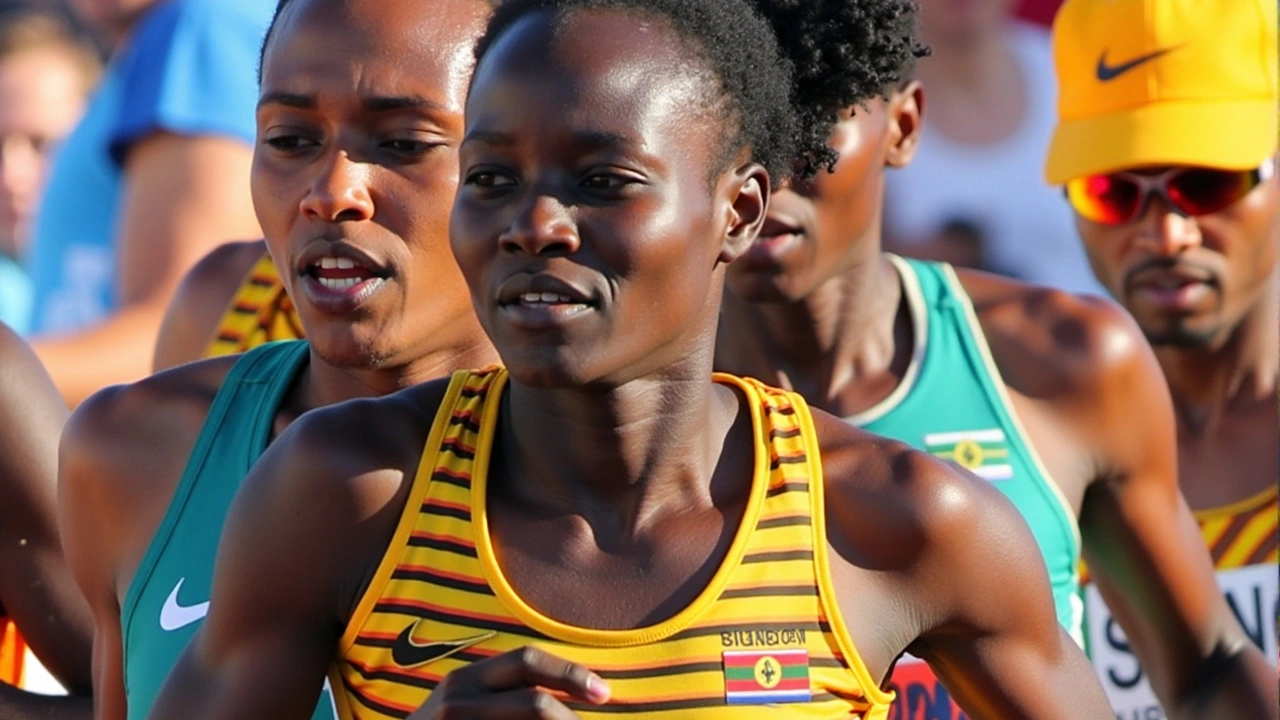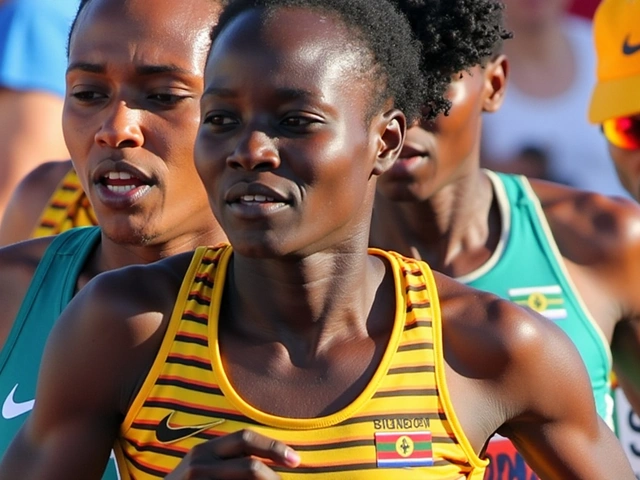Tragic Death of Ugandan Olympian Rebecca Cheptegei: A Case of Domestic Violence
The world of athletics was recently shaken by the tragic death of 33-year-old Rebecca Cheptegei, a prominent Ugandan Olympic athlete. Cheptegei suffered from severe burns after her boyfriend set her on fire in a horrific act of domestic violence. This incident occurred at her residence in Endebess, Trans-Nzoia, Kenya, where she was residing. The event has not only brought immense sorrow to those who knew and admired Cheptegei but also ignited conversations around the urgent need to address domestic violence, especially among female athletes.
Incident Details
On the fateful Sunday, Cheptegei's life took a tragic turn when her boyfriend, Benson Nema Marach, allegedly poured petrol on her and set her alight. The conflict reportedly stemmed from a disagreement regarding a house owned by Cheptegei. Her young daughter was a witness to the horrific scene and even attempted to save her mother. A neighbor also tried to extinguish the flames, albeit unsuccessfully. The whole ordeal was a heart-wrenching scene that had put everyone involved in a state of shock and despair.
With burns covering 75% of her body, Cheptegei was quickly rushed to Moi Teaching and Referral Hospital (MTRH) in Eldoret. Here, she was admitted to the Intensive Care Unit, but despite the best efforts of medical professionals, she succumbed to multiple organ failure four days later. Hospital officials confirmed her death early Thursday morning.
A Rising Star
Rebecca Cheptegei was not just any athlete; she was a symbol of perseverance and dedication. Her journey to the Olympics was marked by hard work and determination. Cheptegei had represented Uganda in numerous long-distance events, making her Olympic debut in the women's marathon at the Paris Olympics. Finishing 44th among the world's best runners was an achievement in itself, highlighting her as a relentless competitor.
Her death has left a gaping hole in the athletic community, not just in Uganda but across the world. Tributes have been pouring in from fellow athletes, coaches, and fans who admired her spirit and tireless pursuit of excellence.
Condemnation and Calls for Justice
The Ugandan Olympic Committee, led by President Donald Rukare, was quick to condemn the violent attack. In a statement, Rukare described the act as 'cowardly and senseless,' calling for immediate and firm action from law enforcement to ensure justice is served. The horrific incident has underscored the need for robust measures to protect athletes from domestic violence and any form of abuse. The call for justice has reverberated through the athletic community, with many hoping this tragic event can serve as a catalyst for change.
Recurring Problem
This tragedy is unfortunately not an isolated incident. The sports community in the region has been marred by violence against female athletes in recent years. The deaths of Kenyan runners Damar Mutua and Agnes Tirop are haunting reminders of the dangers faced by women in sports. These recurring incidents highlight the significant challenges faced by female athletes, both on and off the field.
Marach, who also suffered burns covering 30% of his body, is currently receiving medical treatment. There are ongoing calls for a thorough investigation to ensure that justice is not only served for Cheptegei but also to prevent such tragedies from occurring in the future.
Impact on the Community
Cheptegei's death has had a profound impact on both the local and international communities. Friends, family, fellow athletes, and fans are grappling with the senseless loss of a bright star. The incident has also shone a spotlight on the broader issue of domestic violence, sparking important conversations about the safety and well-being of women, especially those in public life.
Her parents, who are still in shock, recalled their daughter's vibrant personality and unwavering commitment to her sport. In their grief, they are also advocating for change, hoping that their daughter's death will lead to greater protections for other women facing similar threats.
As the athletic community mourns the loss of Cheptegei, there is a growing resolve to address the underlying issues that contribute to such violence. Organizations and advocates are calling for more comprehensive support systems for athletes, increased awareness of domestic violence, and stronger legal frameworks to protect victims.
Cheptegei's tragic death serves as a somber reminder of the work that still needs to be done to ensure that every athlete can pursue their dreams in a safe and supportive environment. Her legacy will undoubtedly inspire continued efforts to combat domestic violence and advocate for the rights and safety of all athletes.



Comments
The world has been ripped of a shining beacon; Rebecca's tragic end feels like a dark cloud settling over every stadium and track. Her relentless dedication was a testament to what can be achieved with sheer will and unyielding perseverance. To think that such a luminous athlete could fall victim to intimate terror is nothing short of a nightmare we cannot ignore. We must channel our outrage into concrete action, ensuring no other runner suffers the same fate.
It's heartbreaking to read about Rebecca's untimely death. For those looking to support athletes facing similar dangers, consider reaching out to organizations like the International Athletes' Union and local shelters that specialize in domestic-violence assistance. Providing safe housing, legal counsel, and mental health resources can make a tangible difference. If anyone needs contact information, feel free to ask-I’m happy to share what I know.
Rebecca was a true champion and her loss hits hard
While the outrage is palpable, let’s remember that the faintest whisper of societal complacency fuels such tragedies. In the grand tapestry of human experience, we often sideline the suffering of those who stand under the spotlight. It’s a paradox-celebrate the victories, yet turn a blind eye to the private battles. Perhaps the real victory lies in reshaping the narrative, ensuring that empathy transcends applause.
Indeed!!! This is not merely a singular incident; it is a systemic failure!!! We must demand legislative reform, enforce stricter protective measures for athletes, and galvanize community vigilance!!! Let us not be complacent-let us be the catalyst for change!!!
Oh great, another ‘tragic’ story we’ll read once and then move on to the next headline. Sure, push some legislation, then forget about it as soon as the next scandal pops up. Classic.
We cannot stand idly by while the very people who inspire us on the world stage are silenced by violence. It’s time to unite across borders, gender lines, and sporting disciplines to create a zero‑tolerance environment for abuse. My heart breaks for Rebecca and her daughter, and I will fight alongside any activist, coach, or fellow athlete to ensure this never repeats.
Rebecca’s legacy reminds us that perseverance must be paired with protection. Let us champion policies that safeguard our athletes, ensuring they can train without fear. Together, we build a stronger, more compassionate sporting community.
Working across cultures, we see that the scourge of domestic violence respects no nationality. It is our collective duty to amplify voices like Rebecca’s, creating cross‑continental coalitions that pressure governments, federations, and law‑enforcement to act decisively. The silence of the past must be shattered by a chorus of global solidarity.
We will not forget. 🙏
The troubling pattern emerging from Rebecca’s case, when examined through the lens of systemic risk assessment frameworks, underscores a multifaceted failure across both micro‑ and macro‑level protective mechanisms. At the individual level, inadequate psychosocial support networks precipitate an environment where intimate partners may resort to coercive control. Simultaneously, institutional protocols within athletic federations often lack robust reporting channels, leading to under‑documented incidents. This confluence of personal vulnerability and bureaucratic inertia creates a fertile breeding ground for violence. Moreover, the sociocultural normalization of aggression in competitive settings can inadvertently desensitize peers to warning signs. From a policy perspective, integrating mandatory safeguarding training into athlete development curricula could mitigate these risks. Additionally, establishing an independent oversight body with jurisdiction across national borders would ensure accountability and consistency in case handling. Funding allocations must prioritize victim support services, including legal counsel, trauma‑informed therapy, and secure housing solutions. Cross‑sector collaboration between sports ministries, health agencies, and non‑governmental organizations is essential to construct a comprehensive safety net. Technological innovations, such as confidential digital reporting platforms, can further empower individuals to seek help without fear of reprisal. Finally, longitudinal research tracking the efficacy of implemented measures will inform iterative improvements, fostering an adaptive response ecosystem. By adopting this holistic, evidence‑based approach, the athletic community can honor Rebecca’s memory through tangible, systemic change.
All that talk about systems and research is nice, but it won’t bring Rebecca back. Maybe next time people will actually listen before it’s too late.
My heart truly goes out to Rebecca’s family. 🌹 It’s a painful reminder that we must keep pushing for safer environments for all athletes. If there’s anything I can do to help spread awareness, count me in.
Rebecca’s story is a profound illustration of how personal tragedy can illuminate broader societal flaws. It forces us to question the adequacy of our support structures and challenges us to act with both compassion and urgency.
What specific steps can we take today to ensure athletes like Rebecca receive the protection they deserve? Are there any pilot programs currently showing promising results? Please share any resources or contacts you have! 🙏